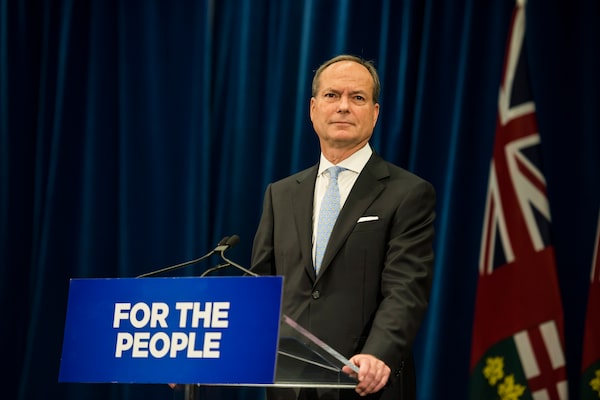Ontario’s government should provide fewer services and charge more for them according to a line-by-line review of the province’s books commissioned by Premier Doug Ford. It recommends selling off Crown assets, consolidating health and other arm’s-length agencies while introducing means-testing for programs.
The review by auditing firm Ernst & Young will serve as part of a road map for the Ford government to find places to cut spending and find so-called efficiencies, according to Treasury Board president Peter Bethlenfalvy. The report is the latest move by Ontario’s nearly three-month-old Progressive Conservative government to focus on attacking the province’s ballooning debt, which the document said was driven partly by a dramatic rise in health and education spending over the past 15 years of Liberal government.

Peter Bethlenfalvy, President of the Treasury Board, speaks to media at Queen's Park in Toronto, Sept. 25, 2018.Christopher Katsarov/The Canadian Press
Finance Minister Vic Fedeli announced last Friday that a commission of inquiry headed by former British Columbia premier Gordon Campbell found that Ontario’s deficit this year has ballooned to $15-billion, largely because of a change in accounting standards long demanded by the province’s Auditor-General. On Monday, Mr. Ford said he would strike a special committee of the legislature to investigate the province’s finances under his Liberal predecessor.
“Faced with this challenge, it would be irresponsible not to act,” Mr. Bethlenfalvy told reporters at Queen’s Park on Tuesday. With the risks of a recession triggered by a trade war or a possible failure of talks to renew the North American free-trade agreement, he said the government is looking to move quickly.
“We’re one bad turn in NAFTA or one global recession away from some real challenges, so it’s incumbent on this government to provide the quality of services that Ontario expects but at a better price point,” Mr. Bethlenfalvy said.
The far-ranging review, which is not considered an audit, provided a number of recommendations the Ford government is considering that could substantially alter how Ontario provides services to its citizens. Along with moving toward providing more digital-only services at Service Ontario and charging higher fees to cover the full cost of government programs – such as at provincial parks or in the court system – the report also suggests that the government should consider selling off part or all of each of its provincial Crown corporations.
The sale of the government-owned businesses, including the Liquor Control Board of Ontario, Ontario Power Generation and the Ontario Lottery and Gaming Corp., could provide a short-term cash infusion for the government.
“Pursuing any of the ideas … would be just the beginning of a process to achieve a fundamental shift in government towards a focus on the delivery of services based on their efficient price,” the report says. “It is clear that taking decisive action is the only way forward to put Ontario on a sustainable fiscal footing.”
While Mr. Ford has promised that no jobs will be slashed in his search for lower spending, unions and other critics have warned they are ready to fight any looming cuts.
Warren (Smokey) Thomas, the president of the Ontario Public Service Employees Union, said in a statement that Ernst & Young’s review shows the government plans to make deep cuts to the public sector and to privatize assets. “Ford’s fiscal approach could result in the most abysmal government failure we’ve seen to-date,” he said, adding he’s “ready for the storm ahead.”
New Democrat MPP Sarah Singh said the Official Opposition was worried about the report’s recommendations. “This government is committed to making deep cuts. We’re not sure where those cuts are going to be, whether in health care or education, but I think they are really setting the stage to make those cuts,” she said.
The review found that most savings are outside of the Ontario Public Service, the body of bureaucrats and employees who report directly to Queen’s Park, and are instead in the broader provincial government, including schools, hospitals and social services. More than 82 per cent of the province’s spending goes to those arm’s-length bodies.
According to a review by the province’s Financial Accountability Office, Ontario has the second-lowest per-capita spending among provinces. Ontario’s spending is nearly the lowest in all categories, except education. The province also has the lowest per-capita revenues. One way to help balance the budget, according to the Ernst & Young review, would be for the Ford government to demand higher transfer payments from Ottawa aimed at "recovering the accurate level of federal funding owed.”